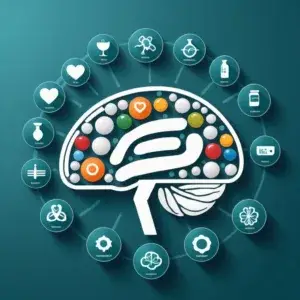Table of Contents
Where It Comes From
Rhodiola Rosea, commonly known as golden root or Arctic root, is an adaptogenic herb found in cold, mountainous regions of Europe and Asia, particularly Siberia. Traditional medicine in Russia, Scandinavia, and other European regions has used this resilient plant for generations to enhance physical endurance, alleviate fatigue, and enhance mental performance. Rhodiola Rosea roots contain the active chemicals rosavin and salidroside, which are believed to contribute to the plant’s stress-relieving and cognitive-enhancing properties.
What It is Indicated For
People generally use Rhodiola Rosea to relieve stress, counteract mental fatigue, boost mood, and improve cognitive performance. It is popular among those who want to improve their mental clarity, focus, and stress tolerance, particularly in stressful settings.
Key Benefits:
- Stress Reduction: Rhodiola Rosea is known for its adaptogenic characteristics, which help the body adapt to stress and maintain balance. In a study published in Phytomedicine, Rhodiola Rosea was found to significantly decrease stress symptoms and increase general well-being in people suffering from stress-related fatigue.
- Mental Fatigue Resistance: Rhodiola Rosea has been shown to combat mental fatigue, particularly during periods of prolonged stress or intense mental activity. Research published in Planta Medica found that Rhodiola Rosea supplementation improved cognitive performance and reduced fatigue in physicians working night shifts.
- Mood Enhancement: Rhodiola Rosea has been linked to improved mood and a reduction in symptoms of depression and anxiety. A study in the Nordic Journal of Psychiatry found that Rhodiola Rosea enhanced mood and emotional stability in individuals with mild to moderate depression.
Contraindications
Most people generally consider Rhodiola Rosea safe, but those with bipolar disorder or prone to manic episodes should use it with caution as it can trigger mood swings. Additionally, people with low blood pressure should consult a healthcare provider before using Rhodiola Rosea, since it may reduce blood pressure even further.
Warnings
While Rhodiola Rosea is well-tolerated by most people, some may experience side effects such as dizziness, dry mouth, or jitteriness, particularly when taken in high doses. It is important to follow the prescribed dosage on the product label and consult with a healthcare expert if you have any concerns or pre-existing medical conditions.
Dosages
The typical dosage of Rhodiola Rosea ranges from 200 to 600 mg per day, standardized to contain 3% rosavins and 1% salidroside. Studies have shown that this dosage reduces stress and improves cognitive performance while causing no notable negative effects. Rhodiola Rosea is best taken in the morning or early afternoon to avoid potential sleep disruption.
Products Contained In
Mind Lab Pro: A comprehensive nootropic stack that includes Rhodiola Rosea for stress reduction and cognitive enhancement.
Qualia Mind: A high-potency nootropic that uses Rhodiola Rosea to support mental clarity, focus, and resilience to stress.
Neuro-Peak: A brain health supplement that incorporates Rhodiola Rosea to combat mental fatigue and improve cognitive function.
References
1. Edwards, D., Heufelder, A., & Zimmermann, A. (2012). Rhodiola rosea L. extract REDUCE-IT reduces self-reported anxiety, stress, anger, confusion, and depression in adults with stress-related fatigue – a randomized, double-blind, placebo-controlled, parallel-group clinical trial. Phytomedicine, 19(14), 1147–1153.
2. Shevtsov, V. A., Zholus, B. I., Shervarly, V. I., Vol’skij, V. V., Korovin, Y. P., & Khristich, T. N. (2003). A randomized trial of two different doses of a SHR-5 Rhodiola rosea extract versus placebo and control of capacity for mental work. Planta Medica, 69(5): 393–399.
3. Darbinyan, V., Kteyan, A., Panossian, A., Gabrielian, E., Wikman, G., & Wagner, H. (2007). Rhodiola rosea in stress induced fatigue – a double blind cross-over study of a standardized extract of SHR-5 with a repeated low-dose regimen on the mental performance of healthy physicians during night duty. Nordic Journal of Psychiatry, 61(1), 20–26.





